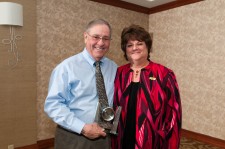Media Briefing: Medication Safety Expert Michael Cohen Explains Risks and Solutions at PULSE of NY Symposium

Wantagh, NY, April 22, 2016 (Newswire.com) - Did you hear about the guy who dipped his contact lenses in a cleaning solution containing hydrogen peroxide and immediately put them in his eyes, with horrible consequences? Actually it wasn't his fault: the product packaging didn't make it plain enough that this wasn't the usual "rinse and use" lens cleaner, but a powerful chemical that needed special handling. And actually it wasn't just one individual: there have been many, many identical cases.
This was just one of dozens of examples of medication-related errors and dangers cited by Michael R. Cohen, head of the Institute for Safe Medication Practices (ISMP), when he spoke on April 18 to a medication safety symposium — Medication Safety: It Starts Before the Prescription — hosted by patient safety education group PULSE of NY.
"This is scary stuff. People really do get hurt when they have mix-ups like this.
Michael Cohen, President, Institute for Safe Medication Practices
Robin Moulder, RN, one of the co-chairs of the evening, representing Diamond Sponsor Memorial Sloan Kettering Cancer Center, opened the evening, welcoming the audience and relating her own story of how, while being treated for cancer, she spotted and questioned a prescription that could have resulted in steroid overdose.
Pharmacist Clemencia Solorzano, also a co-chair and a member of the Professionals for Patient Safety program of PULSE, then discussed the need for greater "health literacy" — the ability to find, understand, and use the health information we need.
Lurking Dangers
When Michael Cohen took the stage, the audience of patient safety advocates, healthcare professionals, and members of the community listened raptly as he described example after example of harm to patients that were reported to his organization.
Problems can crop up seemingly anywhere: packaging and labels, similar product names, dosage markings and standards, dispenser designs, medication shapes and colors, drug interactions, drug "diversion" and abuse. Doctors' handwriting can be problematic: Cohen praised New York State's new mandated electronic prescriptions, saying it would help reduce errors.
And that's not even mentioning ordinary human error: the tired doctor who prescribes the wrong dosage, the pharmacist who misses that error, or the confused patient who doesn't understand (or even read) the instructions.
"This is scary stuff," said Cohen. "People really do get hurt when they have mix-ups like this."
We can do something
Fortunately most of these risks can be reduced, if not eliminated. For each case he cited, Cohen outlined the positive steps that could be or have been made to reduce the risk, such as when the ISMP successfully lobbied for a brand name change on a wart remover that was almost identical to the name of a steroid eye medication.
PULSE of NY President Ilene Corina comments: "We are excited that Mike Cohen came to Long Island to speak to the community and are just as happy with the many medical professionals who came out to hear him speak. The information that he shared was relevant to everyone, and we can all learn from open and honest discussions about how mistakes happen."
While Cohen's ISMP works to fix these problems with medication products, PULSE of NY's focus is on what patients and families can do themselves, by becoming more aware and "health-literate" consumers. One helpful concept PULSE promotes is the "Designated Medication Manager": someone, usually a family member or friend, who agrees to take responsibility for helping the patient with all aspects of prescription drugs, and watches out for mistakes, misuse, and signs of addiction.
For more about ways we can all stay safer while receiving medical care, please contact Ilene Corina on 516-579-4711 or write to info@pulseofny.org.
Source: PULSE of NY
